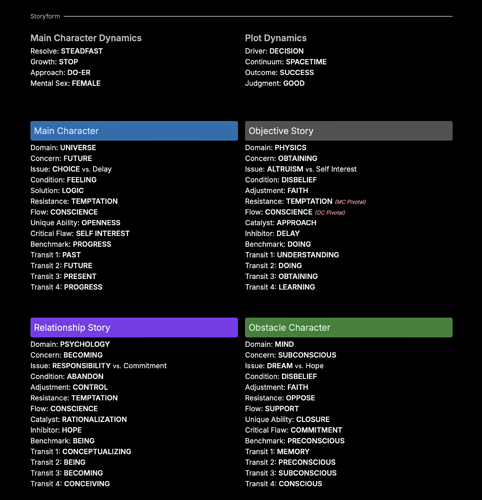You’ve got a quote about the books when before you mentioned you were considering the movies. In the movies they are friends from the start. Even if you change your mind in that, the fact that it has been “changed” in the movies means either it isn’t important to the storyform of movie and book (if they are the same), or Peter Jackson ended up with a different story form (based on you saying that servant to friends is the relationship throughline).
Yeah as i said it’s the destruction of the ring, and the judgement is bad. This isn’t contradictory. It’s linked because Frodo was also trying to destroy the ring and failed.
That was my exact point. That the deus ex machina is weak storytelling, but for Tolkien it was more important to include all the messages he wanted.
Resolve is strong at the start, falters throughout, and fails at the end. A clear progression to me. It’s not an arbitrary cut - it’s the point immediately before the storytelling point to include an intervention from god which resets much of the conflict from before.
I don’t think so. That seems like quite a stretch. In Tolkien’s work, interventions from a higher power happen to save someone from danger after doing the right thing, not to take away responsibility from sinning.
Remember that Frodo was also a broken man (hobbit) after the ordeal, which to me is showing the bad judgement continuing. It is the opposite of triumphant. He was forgiven, but the scars of his failure, both physical and emotional, continue to haunt him.
Perhaps most importantly, if you are saying that Frodo is steadfast, then either Sam or Gollum (others have mentioned it, but i know you are talking about Sam for IC) is a change character. Sam is utterly loyal to Frodo and the quest the whole way through, so he doesn’t change (which is why i think he is a faith character), and Gollum remains obsessed by the ring the whole way through, so he also doesn’t change. I don’t think there is an argument for either of them being change characters, but i’d love to hear one.
Consider that much epic fantasy and sci fi has the OS domain of Activity. I think the Dramatica book even talks about this (the Screenwriting one does too).
I don’t think that is wrong, it’s just when you take a step back, the story is about Frodo’s temptation above all. Dramatica doesn’t preclude things appearing in different places, and i would say the character-interactions around temptation are pushed to the front of the OS throughline, without it being the OS driver. Note also that almost all instances of temptation are interactions with the MC anyway (Gandalf, Bilbo, Aragorn, Boromir, Sam, Gollum, Galadriel, Faramir), showing Frodo the different arguments for remaining steadfast or succumbing to temptation while being influenced by Sauron.
“Thou shalt not kill” Maybe it was as simple as that. That only god can judge sin and dole out punishment, it’s not up to us.
Not sure about the connection here. Frodo succumbed to temptation, but that moment gave meaning to the act of not killing Gollum in the past?
Keep it up please! This is great


 ), and the Final Driver is Sam deciding to spare Gollum.
), and the Final Driver is Sam deciding to spare Gollum. 